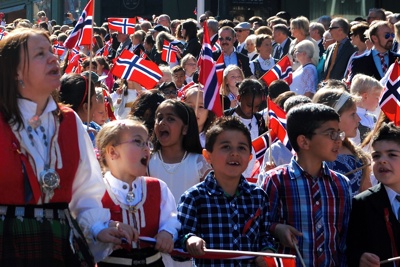As Norwegians gear up to celebrate their national day on the 17th of May, a new survey shows that a majority of them now think immigration has been good for the country. There’s been a sharp rise in the number favouring immigration just since last year.

The survey, conducted by research firm Ipsos/MMI in cooperation with the Nobel Peace Center and newspaper Dagsavisen, shows that 53 percent of those questioned think immigration generally has been good for Norway. That compares to 45 percent in the survey conducted last year. This year marks the third time the survey has been conducted, and its results were unveiled last week.
Only 16 percent of the roughly 1,000 Norwegians questioned think immigration is bad for Norway, while 29 percent saw no difference and 2 percent were unsure. Fully 66 percent said they were not worried about the thousands of asylum seekers Norway has taken in during the past few years and 36 percent said they thought the country should take in more. That compared to 27 percent who think fewer asylum seekers should be accepted and 34 percent who think the current levels should be maintained.
“It’s nice to see that folks’ attitudes towards immigrants and refugees are mostly positive,” said Liv Tørres, director of the Nobel Peace Center, which currently features an exhibit on immigration called Omveier (Detours). She was pleased that all the news about terrorist attacks and the refugee influx “hasn’t made any fears of immigration and asylum seekers greater.”
From skepticism to acceptance
Kristin Rogge Pran of Ipsos noted that last year’s survey was conducted while the news picture was dominated by the refugee crisis and rising numbers of asylum seekers, “and folks were more skeptical. But the negative consequences of the so-called ‘refugee crisis’ didn’t materialize, and now folks are just as positive as they were in 2015 (when the survey was made before the influx of late 2015, when more than 30,000 asylum seekers arrived in Norway).”
Pran noted that Oslo residents remain more positive towards immigration than Norwegians living in towns and cities where they have less contact with immigrants. “Knowledge and experience are important in reducing folks’ worries and prejudices,” Pran said. She told Dagsavisen that those who have the most contact with immigrants become less skeptical.
Dagsavisen interviewed two women at random, sitting at an outdoor café in downtown Oslo last week, and they backed up Pran’s assertions. “We need more in the labour force in various sectors, for example in health care,” said Alice Ennals, age 46. “In that regard, I think immigration is good for Norway.”
She added, however, that “it’s important that those who come here, stay here, and become part of Norwegian society.” Her colleague, Rosa Ortiz, who immigrated to Norway herself 17 years ago, agreed: “Becoming part of society means engaging yourself. Getting a good job is the most important.”
Sharp decline in arrivals continues
The survey was released along with new figures showing another sharp decline in the arrival of asylum seekers in Norway. A total of just 329 came in April, most all of them brought to Norway from camps in Italy and Greece. New figures from immigration agency UDI (Utlendingsdirektoratet) show that 1,593 asylum seekers have arrived in Norway so far this year, only half of them (795) on their own. Around 60 percent were men, with most coming originally from Syria and Eritrea.
“In general, I’d say that the survey shows Norwegians are more positive towards immigration than might be reflected in the media,” Pran told Dagsavisen.
At the same time, another Ipsos survey indicates that half the population thinks Norway’s conservative government coalition is doing a good job of managing immigration and integration. More asylum seekers are being resettled in local communities than ever before, instead of languishing in asylum centers.
“This is very positive,” said Sylvi Listhaug of the Progress Party, who took over the newly created post of Immigration Minister in December 2015. She’s been criticized for imposing new immigration rules that some consider too strict, but she thinks the survey shows that “folks understand the need for strict policies, and integration policies that put demands on those arriving. We need to keep the asylum stream under control, so that we can succeed with integration and keeping Norwegian society secure.”
newsinenglish.no/Nina Berglund

